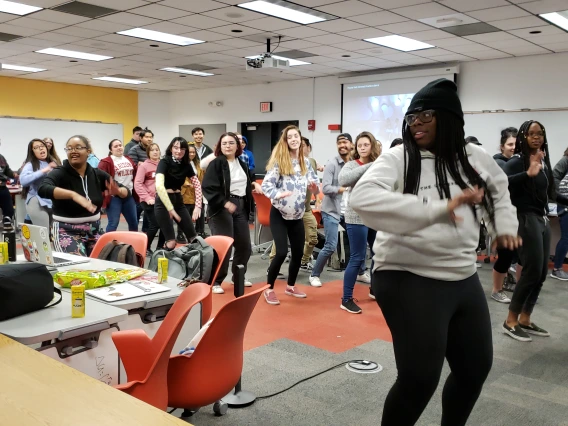
With grant funding from the Academy of Korean Studies, Sunyoung Yang is developing the University of Arizona’s Korean Studies program, focusing the curriculum on hands-on projects to attract and excite students.
Yang, an assistant professor hired as the first tenure-track faculty member of Korean studies in the Department of East Asian Studies, says the popularity of hallyu, or “Korean wave” is drawing students to learn more about Korean culture.
The learning-by-doing component involves class projects like learning K-pop dance, drawing web-toons, making short films, and broadcasting Korean cooking shows on YouTube in addition to reading and writing about Korean pop culture. The projects for her students are similar to ones that Yang had previously collaborated on during her time as a founding member of the Seoul Youth Factory for Alternative Culture, collaborating with engineers and artists on digital storytelling projects.
“I aim to help my students learn by engaging in actual projects like these,” Yang says. “I’ve seen firsthand how effective these projects can be to educate youth in their teens and early 20s. These opportunities will enable students to learn more in depth and critically.”
The combination of hallyu popularity and hands-on learning form the core of new classes, including general education offerings like “K-pop, Webtoons, Ethnic Food, and More: Understanding Korean Popular Culture,” “Introduction to Korea through Films,” and “Class, Gender, and Family in Korea.”
“These courses are in demand for students from diverse social and cultural backgrounds,” Yang says. “Hands-on, project-based Korean popular culture courses will continue to encourage students to develop their creativity required for the knowledge economy.”
The department will continue to develop Korean Studies, which is now offered to students as a minor in either the language or cultural emphasis, in equal standing with Chinese and Japanese studies to create a more comprehensive East Asian Studies program.
“I intend to advance Korean studies at UA as a flagship Korean studies program in the U.S. Southwest,” Yang says.
The curriculum developments complement Yang’s research as a cultural anthropologist, studying on the development of the Internet and various online communities and cultures in Korea and East Asia.
Yang examined the dynamic between online lives and offline struggles in her book “Loser” Aesthetics: Online User Communities and Cultural Politics in South Korea, documenting the influence of new media and information and communication technologies on society with a focus on youth, labor, and gender issues.
A new project, also supported by a grant from the Academy of Korean Studies, will involve more in-depth research on conflicting new gender politics activated in online communities. Issues like the secret and non-consensual use of spy cameras for the filming and photographing of women, the #MeToo movement, misogynistic violence, and protests and demonstrations against the criminalization of abortion are all major concerns online.
“There’s a new phase of social movements demanding gender equity and feminism enhanced by the Internet. These issues have brought about a nationwide awakening,” she says. “Through this research project, I intend to conduct further field research and expand in-depth interviews to include the voices of more diverse actors engaged in these new phenomena, which will provide more meaningful and rich data.”

